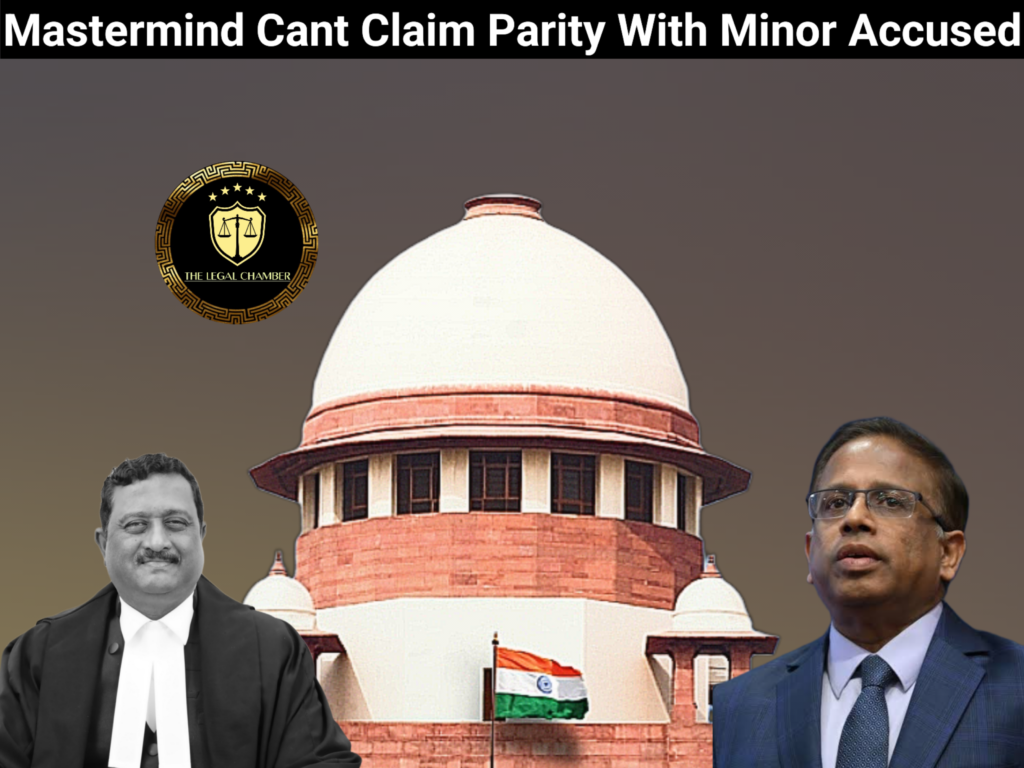
The Supreme Court ruled that bail parity cannot be mechanically applied when material distinctions exist between accused persons. It held that alleged conspirators/masterminds of a serious crime (Section 302 IPC) cannot claim bail parity with minor co-accused, especially when evidence suggests their active role in hiring a contract killer. The Court emphasized that bail decisions must consider the gravity of allegations, evidentiary role of each accused, and potential witness intimidation, rather than granting parity as a blanket rule. The judgment clarified that “parity” under Section 439 CrPC requires comparable roles, not mere similarity of charges.
Facts Of The Case:
The case involves a brutal shooting during a marriage procession in Rajasthan on November 28, 2023. The prosecution alleged that respondents Yashpal and Raman conspired to kill Aman Yadav due to prior enmity stemming from a village dispute on November 19, 2023. They allegedly hired contract killer Vicky @ Kartoos, who fired seven bullets – killing Aman and injuring Vikas and Naveen. An FIR (No. 489/2023) was registered under Sections 302, 307, 120B IPC and Arms Act provisions. Investigation revealed: (1) the weapon was recovered from Yashpal’s house based on Vicky’s confession; (2) test firing was conducted before the murder; (3) respondents absconded for six months. While minor co-accused (Kulwant, Om Prakash) were granted bail considering their peripheral roles, the Rajasthan High Court extended bail to Yashpal and Raman on “parity” grounds despite their alleged role as conspirators. The Supreme Court overturned this decision, noting the respondents were the main accused who: (a) orchestrated the contract killing; (b) possessed the murder weapon; (c) had prior threats against the victim; and (d) posed flight/witness intimidation risks. The Court held bail parity couldn’t apply where evidence showed stark differences in culpability between masterminds and minor participants.
Procedural History:
The case originated with FIR No. 489/2023 registered at Kotkasim Police Station, Rajasthan on 29.11.2023 under Sections 302/307/120B IPC and Arms Act provisions. After investigation, a chargesheet was filed on 27.02.2024, naming Yashpal and Raman as absconding conspirators. Two co-accused (Kulwant and Om Prakash) were granted bail by the Rajasthan High Court in March 2024, considering their minor roles and Om Prakash’s advanced age (84 years). The respondents surrendered on 14.05.2024 after their initial bail applications (No. 4459-60/2024) were dismissed. Their subsequent bail plea before the Trial Court (No. 221/2024) was rejected on 29.05.2024, noting their alleged role as masterminds. A supplementary chargesheet filed on 12.08.2024 further substantiated their conspiracy charges. The High Court’s bail grant on 23.08.2024 (Cri. Misc. Bail App. No. 6946/2024) based on “parity” with co-accused was challenged before the Supreme Court in SLP (Crl.) No. 14681/2024, which converted it to Criminal Appeal No. 2573/2025. On 13.05.2025, the Supreme Court set aside the bail order, directing the respondents to surrender within two weeks while emphasizing that bail parity cannot override role-specific evidence in serious offences.
Court Observation:
The Supreme Court, in its judgment, made several critical observations while overturning the High Court’s bail order. It emphasized that the principle of bail parity cannot be mechanically applied when there exists a clear distinction in the roles and levels of involvement among co-accused. The Court noted that while minor co-accused like Kulwant and Om Prakash were granted bail due to their peripheral roles, the respondents Yashpal and Raman were allegedly the masterminds behind the conspiracy to murder, having hired a contract killer and absconded for six months.
The Court highlighted that bail decisions must consider the gravity of the offence, the evidentiary role of each accused, and the risk of witness intimidation or flight. It observed that the respondents’ active participation in planning and executing the crime, coupled with the recovery of the weapon from their possession, placed them in a categorically different position than the other accused. The judgment underscored that “parity” under Section 439 CrPC requires comparable roles and not just similar charges, and that granting bail to conspirators in a serious offence like murder (Section 302 IPC) would undermine public confidence in the justice system.
Additionally, the Court pointed out that the High Court failed to account for the risk of witness tampering, given the respondents’ history of absconding and their alleged influence in the crime. The Supreme Court reiterated that bail in heinous crimes must be decided on a case-specific basis, balancing individual liberty with societal interest in ensuring a fair trial.
Final Decision & Judgement:
The Supreme Court delivered a decisive judgment in Aashish Yadav v. Yashpal & Ors. (Criminal Appeal No. 2573/2025), setting aside the Rajasthan High Court’s bail order and laying down important legal principles. The Court ruled that bail parity under Section 439 CrPC cannot be mechanically applied when there exists substantial differentiation in the roles and culpability of co-accused. Emphasizing the gravity of the offence – a premeditated contract killing under Section 302 IPC – the Bench noted the respondents’ alleged role as masterminds who hired a professional shooter, arranged the weapon, and absconded for six months distinguished them from other accused who had been granted bail.
The judgment underscored that bail considerations in serious crimes must account for three key factors: (1) the nature and quality of evidence against each accused, (2) potential for witness intimidation, and (3) risk of flight. The Court directed the respondents to surrender within two weeks and clarified that its observations were limited to the bail aspect, leaving the trial court free to independently evaluate the case merits. This ruling reinforces the judiciary’s duty to balance individual liberty with societal interests in serious offences, particularly when conspiracy and organized violence are alleged. The judgment serves as a caution against blanket application of bail parity without examining the accused’s specific role in the alleged crime.
Case Details:
Case Title: Aashish Yadav vs. Yashpal & Ors. Citation: 2025 INSC 666 (Supreme Court of India) Criminal Appeal No.: Criminal Appeal No. 2573 of 2025 Date of Judgment: May 13, 2025 Judges/Justice Name: Hon'ble Mr. Justice K.V. Viswanathan & Hon'ble Mr. Justice Prasanna B. Varale
Download The Judgement Here